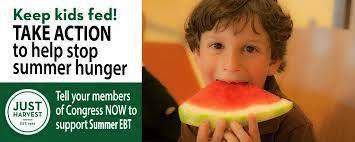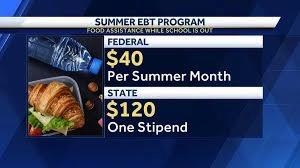 To date, 34 states serving as many as 21 million children have opted into the Federal Summer EBT program for 2024. The program will distribute $2.5 billion as benefits among eligible recipients providing up to $40 per month per child for the summer period when schools are in recess.
To date, 34 states serving as many as 21 million children have opted into the Federal Summer EBT program for 2024. The program will distribute $2.5 billion as benefits among eligible recipients providing up to $40 per month per child for the summer period when schools are in recess.
The program is an extension of the Pandemic EBT program that was established to provide food for needy children when schools were closed due to COVID. Almost all states have programs providing free or subsidized meals for children of families who are financially challenged. The Summer EBT program would fill the three-month gap left during summer school recess.
A USDA demonstration program has shown that children receiving summer EBT benefits received diets of higher quality and were subject to a lower level of food insecurity. The Summer EBT program was strongly endorsed by professionals attending the White House Conference on Hunger, Nutrition and Health and the program was enacted through bipartisan support in 2023.

According to USDA Deputy Secretary, Xochitl Torres Small, “No kid should have to spend their summer hungry without nutritious food.” She added, “Summer EBT is a giant step forward in meeting the needs of our nation’s children and families throughout the year and especially during the summer months.”
Notwithstanding broad support for the program with demonstrated advantages in health and development, Governors of 15 states have spurned federal funds, declining to participate. Governor Kim Reynolds (R) of Iowa stated, “Federal COVID-area cash benefit programs are not sustainable and don’t provide long-term solutions for the issues impacting children and families.” Governor Jim Pillen (R) of Nebraska commented that his state did not need the aid and could tackle hunger by operating feeding sites. Texas has not planned to participate in the Summer EBT program claiming that there was no final rule from the USDA on administration of the program for 2024. Texas suggested that it might consider providing benefits in a subsequent year. Governor Kevin Stitt (R) of Oklahoma noted that his state would not participate in Summer EBT in 2024 based on “technology and staffing issues” but would contemplate future involvement. It is noted that within the state of Oklahoma, the Cherokee and Chickasaw Nations with Federal recognition will be participating on behalf of their children. According to Chris Bernard, President and CEO of Hunger Free Oklahoma, “Our state is always in the bottom ten in the country in terms of food security, families and kids are struggling and the summer food program was something we’ve supported for a long time.”

Apart from improving child nutrition that has lifelong benefits, the summer EBT program will increase consumption of foods including eggs that are permitted under USDA SNAP-WIC rules.
The Summer EBT program that was introduced to cover the summer school recess is complementary to a move to serving universal free school meals. States that have introduced or have expanded access to school meals include New Jersey. Children from families in this state with an income of up to twice the federal poverty level will receive free meals.
Oklahoma, despite the rejection of 2024 Summer EBT funding, is considering free school meals statewide with an income restriction. South Dakota will subsidize breakfast and lunch servings at schools. Florida is considering free school meals regardless of income. States including Arizona, Ohio and Louisiana have programs subsidizing meals during school terms.
The USDA will continue to provide support and training for states, territories and tribes intending to implement Summer EBT in 2024 and in subsequent years.
 Depriving children of necessary food on philosophical or political grounds is unconscionable. The attitude expressed by apparently well-fed Governor Jim Pillen of Nebraska, who is on record of stating “I don’t believe in welfare” is both inhumane and neglects reality. Similar sentiments expressed by other politicians denote a streak of cruel indifference that ultimately will be counterproductive in terms of long-term expenditure of state funds. EGG-NEWS strongly supports investment in school feeding, providing that programs are operated with a high standard of nutrition and devoid of waste and are administered equitably with transparency and efficiency.
Depriving children of necessary food on philosophical or political grounds is unconscionable. The attitude expressed by apparently well-fed Governor Jim Pillen of Nebraska, who is on record of stating “I don’t believe in welfare” is both inhumane and neglects reality. Similar sentiments expressed by other politicians denote a streak of cruel indifference that ultimately will be counterproductive in terms of long-term expenditure of state funds. EGG-NEWS strongly supports investment in school feeding, providing that programs are operated with a high standard of nutrition and devoid of waste and are administered equitably with transparency and efficiency.